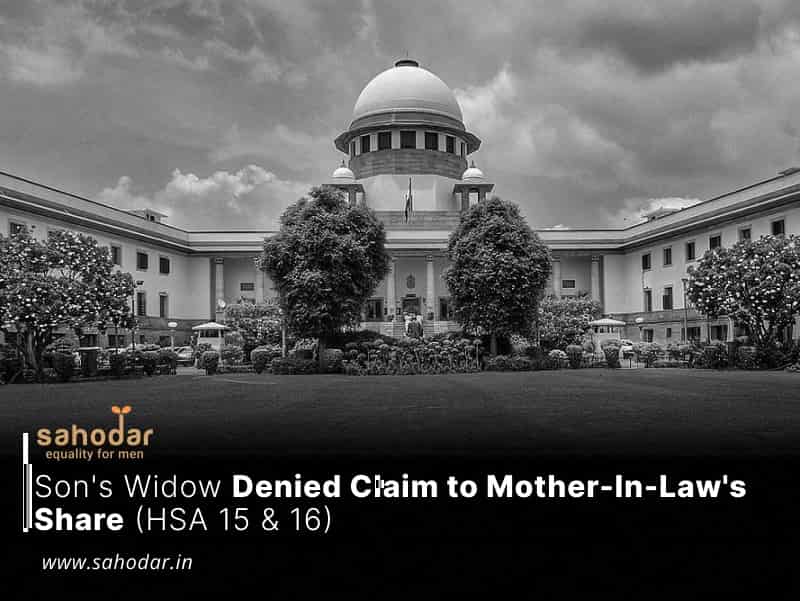The Supreme Court has pronounced that, in accordance with Sections 15 and 16 of the Hindu Succession Act (HSA), the prima facie entitlement to assert a share in the joint family property allocated to the mother-in-law does not vest with the widow of the pre-deceased son.
This determination arose from an appellate challenge against a High Court adjudication wherein the spouse of the pre-deceased son was adjudged entitled to a fractional share of 1/7th emanating from 1/8th and 1/16th proportions of the mother-in-law’s interest in the contentious properties.
“A combined reading of Section 15(1)(a) and Section 16 of the Act would make it manifest that the property of a female Hindu dying intestate shall devolve, firstly, upon the sons and daughters (including the children of any pre-deceased son or daughter) and the husband. Therefore, the plaintiff being the widow of the pre-deceased son does not have the first right or entitlement to receive any share in the share of her mother-in-law”, the Bench comprising Justice B.R. Gavai, Justice Hima Kohli and Justice Prashant Kumar Mishra held.
Advocate Balaji Srinivasan acted as counsel for the Appellant, Sachidhanandam, while Advocate K Krishna Kumar represented the Respondent, Vanaja.
The subject matter of the litigation pertained to the estate of Nallathambi Chittiar, the progenitor of Elango. Elango, who contracted matrimony with Vanaja, assumed the role of Plaintiff in the Original Suit. The legal contest involved the widow of Nallathambi Chettiar (Plaintiff’s Mother-in-law) and her progeny, specifically Sachidhanandam, designated as the Second Defendant. In the adjudication of Vanaja’s suit for partition, the Trial Court accorded her a 1/8th share in the properties delineated in Schedule B, C, and C1.
Contrarily, the First Appellate Court favored Sachidhanandam, determining the entitlement of the Plaintiff’s Mother-in-law to a 1/16th share in the specified Schedule B and C1 properties. Additionally, the Court afforded Vanaja the procedural avenue to seek redress under Order XX Rule 12 of the Civil Procedure Code (CPC) concerning mesne profits associated with Schedule C1 and B. Upon further appeal, the High Court affirmed Vanaja’s entitlement to a 1/7th share, computed from the share of her mother-in-law in the Schedule B, C, and C1 properties. Dissatisfied with this adjudication, Sachidhanandam sought recourse in the Supreme Court.
The Supreme Court expounded that the intestate succession of a deceased Hindu female’s estate is delineated by the statutory provisions enshrined in Sections 15 and 16 of the Hindu Succession Act (HSA). These sections prescribe the hierarchical sequence for the devolution of property rights among the legal heirs.
“Sections 15 and 16 of the Act provide that the property of a female Hindu dying intestate shall devolve according to the rules set out in Section 16. Section 15(1)(a) provides that such devolution shall be firstly, upon the sons and daughters (including the children of any pre-deceased son or daughter) and the husband. The rule for distribution of the intestate property of a female Hindu and order of succession is provided under Section 16 of the Act according to which, the order of succession among the heirs of a female Hindu referred to in Section 15 shall be firstly, as per rule 1 thereof, among the heirs specified in sub-section (1) of Section 15 of the Act”, the Bench noted.
The court concurred with the High Court’s determination regarding the joint family character of the contested properties. Nonetheless, it identified an error in the application of Sections 15 and 16 by the High Court, specifically in the allocation of a 1/7th share from the 1/8th and 1/16th proportions of the mother-in-law’s entitlement.
Consequently, the court, in the exercise of appellate jurisdiction, granted the appeal and set aside the impugned judgment.

